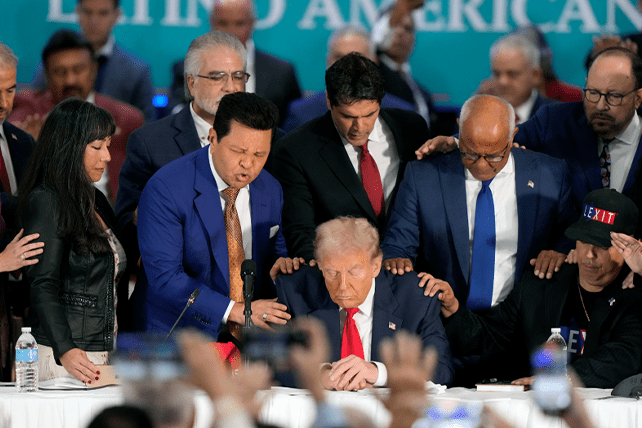
The Rev. Gabriel Salguero. (Photo courtesy of The Gathering)
But Trump’s vast improvement among nonwhite Protestants, especially Hispanic and Asian Protestants, is harder to understand given Trump’s promise of a crackdown on immigration.
Gabriel Salguero, president and founder of the National Latino Evangelical Coalition, said there were a host of issues that led Hispanic evangelicals to vote for Trump — among them, a more traditional understanding of marriage and sexual identity, a focus on economic issues and a belief that Trump would only go after immigrants who were violent criminals.
“It’s not one issue because Latino evangelicals are not one-issue voters,” said Salguero, who is a pastor of an Assemblies of God church in Orlando, Florida. “This list of issues, from the economy to social issues around pro-life, around biblical understandings of marriage, and in addition to the economic things, plus, the Trump administration was intentional in outreach to Latino evangelicals by going to their churches, having spots on their radio station, yielded an impact.”
Salguero said he will be looking to see how Latino evangelicals vote in the 2026 midterms.
Many of the larger demographic divisions that have characterized American politics for several decades also showed up in the study. Trump had a 14-point advantage among voters who did not attend college (56% to 42%), double his margin in 2016. He won voters living in rural areas by 40 points (69%-29%), higher than his margins in 2020 or 2016. And older voters favored Trump: 54% voted for Trump in 2024, compared with 52% in 2020. Younger voters tended to favor the Democratic candidate.
Among the 7,100 validated voters, the margin of error was plus or minus 1.5 percentage points.

Republican presidential nominee former President Donald Trump watches a video screen at a campaign rally at the Salem Civic Center, Nov. 2, 2024, in Salem, Va. (AP Photo/Evan Vucci)
This article originally appeared here.

